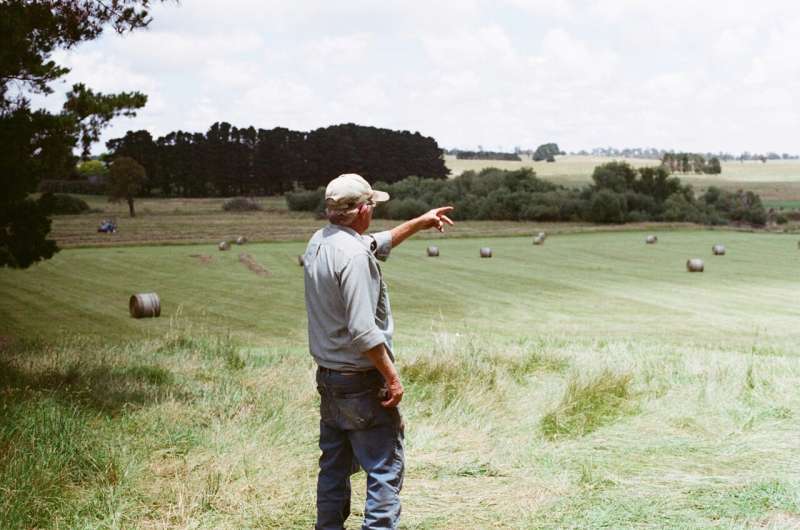This article has been reviewed according to Science X's editorial process and policies. Editors have highlighted the following attributes while ensuring the content's credibility:
fact-checked
peer-reviewed publication
trusted source
proofread
Cancer in rural Upstate New York: Study reveals obstacles, opportunities for care

People struggling with cancer who live in rural areas outside Rochester confront transportation issues and unique challenges related to farm life, a Wilmot Cancer Institute study shows.
The research, reported in the journal BMC Cancer, is an important step toward meeting the needs of farmers and other rural-dwelling older adults, who are underserved in cancer care.
During open-ended interviews with Wilmot investigators, rural cancer survivors did not mince words.
One person said, "He [the surgeon] told me he wanted to operate on the next Monday, and I told him I didn't think I could get rid of the cows that fast because I'm a dairy farmer and I had 60 cows to milk every day."
"Our life is very centered around the animals," a separate survivor added. "I don't think they (providers) know that."
Another farmer described frustration with healing after treatment. "I'd like to get back to work, but I just can't do a lot. I was born on this farm and I kind of kept my body young. I've always worked, I've always been active. I'd like to get things done the way they were, but then when you're 76 years old I guess that don't happen."
The study was small (27 participants) but it starkly illustrates real-world dilemmas for individuals who are used to independence and rural lifestyles. They were treated for cancer at one of Wilmot's 13 locations.
The objective was to heighten awareness of survivorship needs from the perspective of the patients, said senior author Supriya Mohile, MD, a pioneer in geriatric oncology and co-leader of Wilmot's Cancer Prevention and Control research program.
The study also called attention to the need for expanded services (including telehealth options), and to create deeper doctor-patient relationships. Importantly, it confirmed that older adults in rural areas are willing to participate in Wilmot clinical trials, added Jason Zittel, MD, co-author and Wilmot oncologist located in rural Dansville, N.Y., at the Ann and Carl Myers Cancer Center.
"Our care for the patient does not end when the treatment ends," Zittel said. "Each patient has their own unique concerns and preferences and it's important to take the time to inquire about them as they enter survivorship."
Facts tell the story
According to Wilmot data culled from local, state, and national statistics:
- Nearly 65% of cancer survivors are 65 or older. By 2040, it is estimated that almost 50% will be age 75 or older.
- Older adults often have other illnesses in addition to cancer (high blood pressure, arthritis, heart disease, for example), and experience loss of memory and cognitive issues. Many struggle to care for themselves at home.
- Although geriatric oncology research has exploded in recent years, much of it has excluded rural-dwelling adults.
- In 2023, more than 34% of patients seeking care at Wilmot were rural residents. They live in a 27-county region that's larger than the states of Vermont and New Hampshire combined—encompassing Rochester, the Finger Lakes, Southern Tier, and central New York.
- The largest number of Wilmot's rural patients reside in Livingston and Steuben counties, in sprawling areas that include dairy and field-crop farms, food production, wine-making, salt mines, and other industry.
- Cancer incidence rates in the 27-county region served by Wilmot are higher than state and national averages, and second highest in the U.S. behind Kentucky. The reasons are not completely clear, although smoking rates are also higher here, and rural residents tend to be poorer and have less access to preventative care and specialty care.
Rural cancer patients want more from care team
By conducting open-ended interviews, researchers gathered patient views on survivorship challenges with the goal of finding new ways to intervene.
All people who participated in the study had taken chemotherapy during the past 12 months, with the intent to cure their cancer. Mean age of the participants was 73, and the majority had stage 3 disease, which means they could benefit from chemotherapy due to a higher risk of microscopic spread of cancer.
Several themes emerged from study participants, including a general lack of communication about survivorship with their care team, physical and psychological challenges, and worry over paying medical bills. Many said they wanted professional advice about nutrition and exercise.
Transportation was a key issue for many patients, who did not like to drive to Rochester for care and had to rely on others to get to cancer appointments, whether in the city or in their rural hometowns.
"He [my son] took me to all those appointments and I have a friend that [also] takes me, because I won't drive to the city," said one 76-year-old patient.
A76-year-old study participant added, "I've been here in this town so long and I don't even know where anything is. I'm not a good driver. I don't want to get in a lot of traffic and stuff."
Health care providers should consider the particular needs of rural, older adults and educate them on survivorship care, and how to overcome challenges to improve quality of life, the study authors concluded.
Mohile noted that Wilmot already has specialty programs in place for survivorship and for geriatric oncology at a clinic in Rochester, and would like to expand these offerings to rural areas through telemedicine, in partnership with Wilmot's Community Cancer Action Council.
Future research on rural adults with cancer should include Hispanic farmworkers; in the current study, the vast majority of participants were white, the study noted.
More information: Evelyn Arana-Chicas et al, Cancer survivorship challenges of rural older adults: a qualitative study, BMC Cancer (2023). DOI: 10.1186/s12885-023-11395-z



















